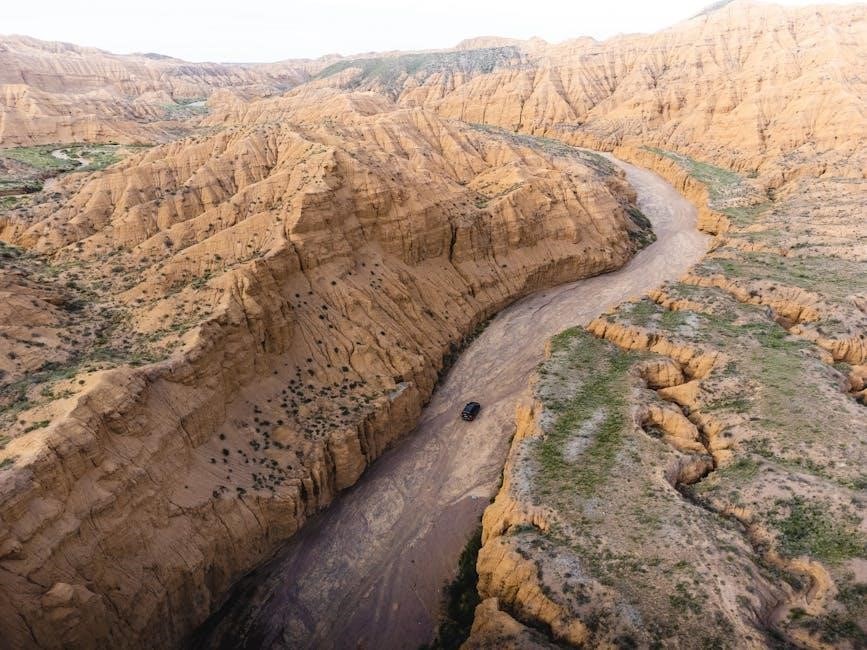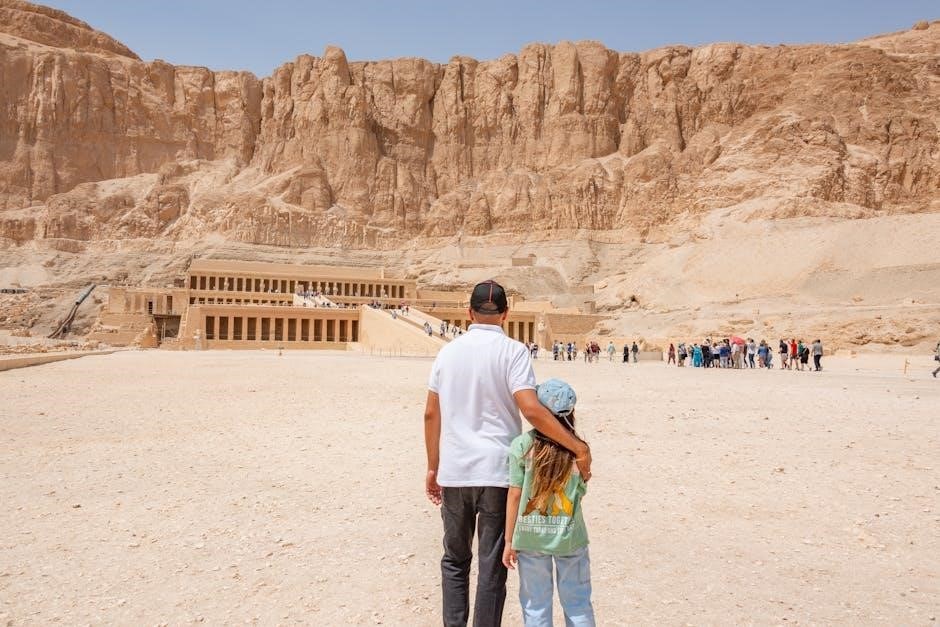The Sayings of the Desert Fathers, known as the Apophthegmata Patrum, are a collection of wisdom teachings from early Christian monks. These sayings, compiled into texts like the Alphabetical Collection, offer insights into humility, prayer, and solitude. Widely read and translated, they remain a foundational text for monasticism and spirituality, with PDF editions by scholars like Benedicta Ward and Cistercian Publications providing accessible resources for modern readers.
Who Were the Desert Fathers?

The Desert Fathers were early Christian ascetics who lived in the deserts of Egypt, Palestine, and Syria during the 3rd to 5th centuries. They sought a life of solitude, prayer, and self-denial, fleeing worldly distractions to focus on spiritual growth. These monks, both men and women, became renowned for their wisdom, humility, and devotion. Their teachings, often shared through concise sayings, emphasized inner transformation and a deep connection with God, shaping Christian monasticism and spirituality for centuries to come.
The Significance of Their Teachings
The Desert Fathers’ teachings are profoundly significant, offering timeless wisdom on humility, compassion, and the pursuit of a God-centered life. Their sayings emphasize inner transformation, self-reflection, and the importance of living simply. These teachings not only shaped early Christian monasticism but continue to inspire modern spirituality, providing practical wisdom for everyday life. Their legacy endures as a testament to the enduring power of faith and the human quest for spiritual depth and authenticity.

Historical Context of the Desert Fathers
The Desert Fathers emerged in the 3rd-5th centuries, fleeing persecution and societal chaos to live ascetic lives in Egypt’s deserts. Their teachings, compiled in texts like the Apophthegmata Patrum, reflect early Christian monasticism’s rise and the desert’s spiritual significance. These sayings, now available in PDFs, preserve their wisdom for modern readers, connecting past and present in a shared quest for spiritual truth and inner peace.
Early Christian Monasticism
Early Christian monasticism emerged in the 3rd century as a response to persecution and a desire for a devout, isolated life. Pioneers like Anthony the Great embraced the desert, establishing ascetic communities. Their way of life emphasized prayer, fasting, and humility, laying the groundwork for monastic traditions. The sayings of these desert fathers were later compiled into texts, preserving their wisdom for future generations. These teachings, now accessible in PDFs, continue to inspire spiritual seekers and scholars alike, bridging ancient practices with modern spirituality.
The Role of the Desert in Their Spirituality
The desert was a central symbol in the spirituality of the Desert Fathers, representing solitude, purification, and a return to the biblical wilderness. It served as a physical and spiritual testing ground, fostering humility, detachment, and a focus on God. The harsh environment mirrored their inner struggles, while its vastness reflected the boundless mercy of God. Their sayings, now widely available in PDFs, reveal how the desert shaped their teachings on prayer, simplicity, and the pursuit of divine wisdom.

Structure and Compilation of the Sayings
The sayings were compiled into collections like the Alphabetical Collection, organizing teachings thematically and alphabetically. This structure provided practical guidance for monks, preserving wisdom for future generations.
The Alphabetical Collection
The Alphabetical Collection organizes sayings alphabetically by author, offering practical wisdom on humility, prayer, and solitude. Edited by scholars like Benedicta Ward, it remains a vital resource for understanding early monasticism, with PDF editions making it accessible to modern readers. This structure ensures the teachings endure, providing guidance for both monks and laypeople seeking spiritual growth.
Purpose and Audience of the Compilation
The sayings of the desert fathers pdf were compiled to preserve the wisdom of early monastic leaders for future generations. Primarily intended for monks, these teachings emphasize humility, prayer, and solitude. The collection serves as a spiritual guide, offering practical advice for ascetic living. Available in modern formats like PDF, it caters to both monastic communities and lay readers, ensuring the timeless wisdom of the desert fathers remains accessible and relevant today.

Prominent Desert Fathers and Their Contributions
Anthony the Great, known as the “Father of Monks,” founded Christian monasticism. His life inspired many, shaping the desert fathers’ movement. Other key figures like Abba Arsenius contributed wisdom, emphasizing humility and solitude, as recorded in the sayings of the desert fathers pdf.
Anthony the Great: The Father of Monks
Anthony the Great, born in Egypt around 251 AD, is revered as the founder of Christian monasticism. His life, marked by a dramatic response to a Gospel sermon, led him to embrace asceticism. Renouncing wealth, he lived in solitude, practicing intense prayer and self-discipline. His wisdom and holiness attracted followers, establishing the first monastic communities. Anthony’s teachings, recorded in the sayings of the desert fathers pdf, emphasize humility, compassion, and the importance of solitude in the spiritual life.
Abba Arsenius and Other Key Figures

Abba Arsenius, a former Roman senator, renounced his wealth to embrace a life of solitude and prayer in the Egyptian desert. Known for his humility and wisdom, his sayings emphasize the importance of inner purity and detachment from worldly desires. Alongside other prominent figures, such as Abba Moses and Abba Poemen, their teachings in the sayings of the desert fathers pdf provide timeless spiritual guidance, reflecting the diversity and depth of early monastic wisdom.
Key Themes and Teachings in the Sayings
The sayings emphasize humility, compassion, and the importance of prayer and solitude. They offer practical wisdom for spiritual growth, accessible in modern PDF editions for contemporary readers.
Humility and Compassion
The sayings of the Desert Fathers highlight humility as a cornerstone of spiritual life, teaching monks to renounce pride and self-reliance. Compassion is equally central, urging believers to love and serve others without judgment. These virtues are illustrated through practical examples, such as Abba Anthony’s advice to avoid boasting about achievements. The teachings emphasize that true humility and compassion lead to inner peace and a deeper connection with God, making these principles timeless for modern spirituality, as seen in PDF editions of their sayings.

The Importance of Prayer and Solitude
Prayer and solitude are central to the teachings of the Desert Fathers, seen as essential for spiritual growth and intimacy with God. The sayings emphasize continuous prayer as a means to cultivate inner stillness and detachment from worldly distractions. Solitude provided the fathers with the space to reflect, listen to God, and confront their own hearts. These practices, shared in PDF editions of their sayings, remain vital for modern seekers of a deeper spiritual life, offering guidance on living a prayerful and contemplative life.

Transmission and Translation of the Sayings
The sayings were initially shared orally before being written down, preserving the wisdom of the Desert Fathers. Translations into various languages, including PDF editions, ensure their enduring accessibility.
From Oral Tradition to Written Text
The sayings of the Desert Fathers began as oral teachings, shared among monks and seekers. Over time, these wisdom-filled utterances were compiled into written collections, such as the Apophthegmata Patrum. Monks and scholars like Benedicta Ward transcribed and translated these texts, preserving their spiritual depth. The transition from spoken words to written form ensured their survival, making the teachings accessible to future generations. This process highlights the enduring value of these sayings in Christian spirituality and monastic practice.
Modern Translations and Editions
Modern translations of the Desert Fathers’ sayings, such as the Apophthegmata Patrum, have made these teachings widely accessible. Scholars like Benedicta Ward and Cistercian Publications have produced renowned translations, preserving the spiritual depth of the original texts. PDF editions, including Ward’s 1975 translation, are popular for their clarity and organization. These modern resources ensure the timeless wisdom of the Desert Fathers remains relevant, offering insights into humility, prayer, and solitude for contemporary readers and spiritual seekers alike.

Influence on Christian Mysticism and Thought
The Sayings profoundly shaped Christian mysticism, emphasizing humility and prayer. Their teachings, accessible through PDF editions, continue to inspire spiritual seekers and scholars alike today.
Impact on Monasticism
The Sayings deeply influenced monasticism by providing practical wisdom for monks. Their emphasis on humility, prayer, and solitude shaped both communal and solitary monastic life. These teachings, preserved in PDF editions, continue to guide monastic practices, offering timeless principles for spiritual growth and communal harmony. The Sayings remain a cornerstone of monastic tradition, inspiring generations to embrace a life of devotion and simplicity.
Relevance in Contemporary Spirituality
The Sayings of the Desert Fathers remain remarkably relevant in modern spirituality, offering timeless wisdom on humility, compassion, and prayer. Their teachings, now widely available in PDF formats, provide guidance for those seeking deeper spiritual growth. The emphasis on mindfulness and inner peace resonates with contemporary seekers, making these ancient wisdom teachings a valuable resource for navigating life’s challenges in a fast-paced world.

Primary Sources and Resources
The Apophthegmata Patrum, or Sayings of the Desert Fathers, is the primary source, with key editions like Benedicta Ward’s 1975 translation. These texts are foundational for understanding early monastic wisdom and remain accessible in modern PDF formats for spiritual seekers.
The Apophthegmata Patrum
The Apophthegmata Patrum, or Sayings of the Desert Fathers, is a seminal collection of teachings from early Christian monks. Compiled primarily for monastic use, it captures wisdom on humility, prayer, and solitude. Translated by scholars like Benedicta Ward, these sayings are now widely accessible in PDF formats, preserving their spiritual insights for modern readers. They remain a cornerstone of Christian mysticism and monastic tradition, offering timeless guidance for spiritual growth and reflection.
Recommended PDF Editions
Several PDF editions of the Sayings of the Desert Fathers are highly recommended for their scholarly accuracy and accessibility. Notable editions include translations by Benedicta Ward and publications by Cistercian Studies, such as the revised Alphabetical Collection. These PDFs provide comprehensive introductions, translations, and commentary, making them invaluable resources for both scholars and general readers seeking to explore the wisdom of the Desert Fathers in a convenient digital format.

